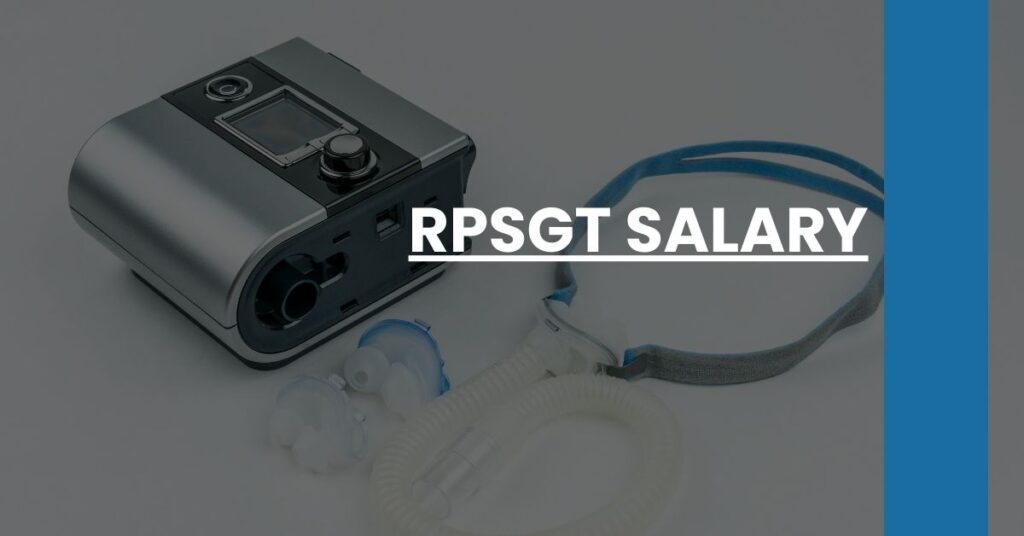Registered Polysomnographic Technologist (RPSGT) salaries in the United States average around $53,249 annually, with variations depending on factors such as experience, location, and workplace setting. For those curious about embarking on this career or advancing further within the field, the RPSGT credential can open doors to competitive compensation packages and diverse opportunities in healthcare.
In this article, you will gain insights into:
- The impact of geographical location and experience on an RPSGT’s salary
- Salary comparisons among hospitals, sleep clinics, and research settings
- How additional certifications and specializations can influence your earnings as an RPSGT
Seeking the best return for your expertise as an RPSGT? Read on for invaluable tips on maximizing your salary potential.
- Understanding the RPSGT Credential
- Factors Influencing RPSGT Salary
- Average Salary for RPSGTs in the United States
- Salary Comparisons by Workplace Settings
- Benefits and Perks for RPSGT Professionals
- Advancing Your Career as an RPSGT
- Navigating the Job Market: Tips for RPSGTs
- Conclusion: The Value of the RPSGT Credential in the Healthcare Sector
Understanding the RPSGT Credential
The journey to becoming a Registered Polysomnographic Technologist (RPSGT) is both challenging and rewarding. It’s one that signals your expertise in the world of sleep studies, a crucial component in diagnosing and treating sleep disorders that affect millions globally. If you’re considering this career path or already walking it, comprehending what lies behind the RPSGT title can help you navigate it with confidence.
An RPSGT is a healthcare professional who has demonstrated excellence in the field of sleep technology. To earn this credential, you must meet specific educational requirements, accumulate hands-on experience, and pass a rigorous exam by the Board of Registered Polysomnographic Technologists (BRPT). It’s a mark of quality that speaks volumes to employers, colleagues, and patients alike. You become a trusted expert in conducting and analyzing sleep studies—work that is critical for the millions suffering from sleep apnea, insomnia, and other sleep disorders.
As an RPSGT, your credential is not just about what you do, but how you do it. Your expertise ensures that patient care is insightful, compassionate, and backed by the latest in sleep science, making you an integral piece in the ever-evolving puzzle of healthcare.
Factors Influencing RPSGT Salary
When it comes to your earning potential as an RPSGT, various factors come into play. Understanding these elements can aid you in charting a course through your career landscape to potentially higher and richer terrains. Here are the major influencers:
- Geographical Location: The region where you work significantly impacts your salary. States with higher living costs often offer higher salaries to compensate.
- Experience: As with many professions, the more experienced you are, the more valuable you become. Seasoned RPSGTs often command higher salaries.
- Education Level: While certification as an RPSGT is non-negotiable, additional educational qualifications can enhance your earning potential.
- Type of Employer: Hospitals, sleep clinics, and even private practices can vary greatly in their pay scales for RPSGTs.
As these variables mesh together, they form a financial picture unique to you and your career circumstances.
Average Salary for RPSGTs in the United States
Let’s talk numbers: what can you actually expect to earn as an RPSGT? On average, a Registered Polysomnographic Technologist enjoys a national average salary of around $53,249. But don’t be misled by averages—they can conceal as much as they reveal. Salaries can swing dramatically depending on specific locations and the factors we discussed above.
For instance, if you’re in a metropolitan area teeming with high-tech sleep clinics and research centers, your salary might soar above that national average. Conversely, smaller towns or less populated states might offer salaries that don’t hit that average mark but could be compensated by a lower cost of living or other benefits.
So as you navigate your career path, it’s wise to consider not just the salary but the whole package: cost of living, work-life balance, and the satisfaction of the job itself.
Salary Comparisons by Workplace Settings
Now let’s dig a bit deeper. Where you hang your lab coat each day—as in, your workplace setting—plays a pivotal role in your salary. Here’s a quick snapshot of potential workplace settings:
- Hospitals: Often the major employers for RPSGTs, hospitals tend to have structured pay scales with clear pathways for progression.
- Sleep Clinics: Specialized and usually focused on patient comfort and state-of-the-art technology, these settings can offer competitive salaries as they seek to attract the best talent.
- Research Facilities: Here, you could be part of cutting-edge studies, which might command a salary to match the innovation and expertise required.
In each of these environments, consider the intangibles, too—the professional satisfaction of pioneering sleep medicine in a research facility, or the community impact you can affect in a public hospital.
Now, knowing all these details, you’re better equipped to dive into the specifics about benefits and perks for RPSGTs, yet another fundamental part of your compensation puzzle. Let’s explore what awaits beyond your paycheck.
Benefits and Perks for RPSGT Professionals
When evaluating the full extent of your compensation as an RPSGT, salary is just the tip of the iceberg. The hidden benefits and perks can significantly boost the attractiveness of a job offer. While these can vary widely across different employers and workplace settings, here are some common benefits you might anticipate:
- Health Insurance: Many employers offer comprehensive health plans, sometimes including dental and vision coverage.
- Retirement Plans: Contributions to 401(k) plans or other pension schemes can be a major plus for your long-term financial health.
- Paid Time Off (PTO): Accumulating PTO for vacations, personal days, or sick leave contributes to work-life balance.
- Continuing Education: Employers may provide assistance or reimbursement for ongoing education, helping you stay current in the field.
- Shift Differential: For those working nights or weekends, extra compensation is often offered.
These benefits represent not only a substantial part of your compensation package but also reflect an employer’s commitment to your well-being and professional growth.
Advancing Your Career as an RPSGT
What if you want to elevate your career — and potentially your RPSGT salary? Your growth as a professional isn’t static. Advancing in terms of salary often corresponds to advancing in your career through further education and specialization. Here’s how:
- Specializations: Sub-specialties in sleep medicine can indicate expertise and lead to increased pay.
- Leadership Roles: Supervisor or management positions can bump up your salary.
- Education: Attaining a bachelor’s or master’s degree in a related field might open up doors for higher-paying roles.
- Additional Certifications: Certifications show a commitment to your profession and sometimes have the power to push your salary upward.
Each of these steps can enrich your professional experience and make you a formidable candidate for high-paying positions within the scope of sleep technology.
Navigating the Job Market: Tips for RPSGTs
Stepping into the job market can be daunting. Here are strategic pointers to ensure you’re not selling yourself short:
- Research Thoroughly: Understand the going rates for an RPSGT in your desired location and setting. Websites like Salary.com can offer helpful salary data.
- Network Effectively: Relationships in the healthcare industry can lead to new opportunities and insights into salary standards.
- Negotiate: Approach salary discussions with confidence and data to back up your requests.
- Highlight Your Achievements: Be prepared to discuss how your specific skills can benefit the potential employer.
In the vast sea of job listings, your aim should be to find a position that not only fits your salary expectations but also promises a conducive environment for your ongoing professional journey.
Conclusion: The Value of the RPSGT Credential in the Healthcare Sector
As an RPSGT, you are not just a guardian of the night, watching over the sleep patterns of your patients; you are a valued member of the healthcare community with a specialized skill set. With the insights gained throughout this article, you’re better equipped to explore the salary landscape that awaits.
The RPSGT salary encapsulates more than just dollars and cents—it’s a reflection of the critical work you do to improve patient outcomes and advance the field of sleep medicine. Your certification is not only an advantage in negotiating for a competitive salary but also in affirming your commitment to a field that promises growth and fulfillment.
Empowered with the knowledge of how different factors influence your earning potential, the additional benefits that might come your way, and strategies for advancing your career, you’re set to navigate the job market with assurance. Remember, you bring a unique blend of expertise and dedication to the table — never underestimate the value you add to any professional setting within the vibrant world of healthcare.

